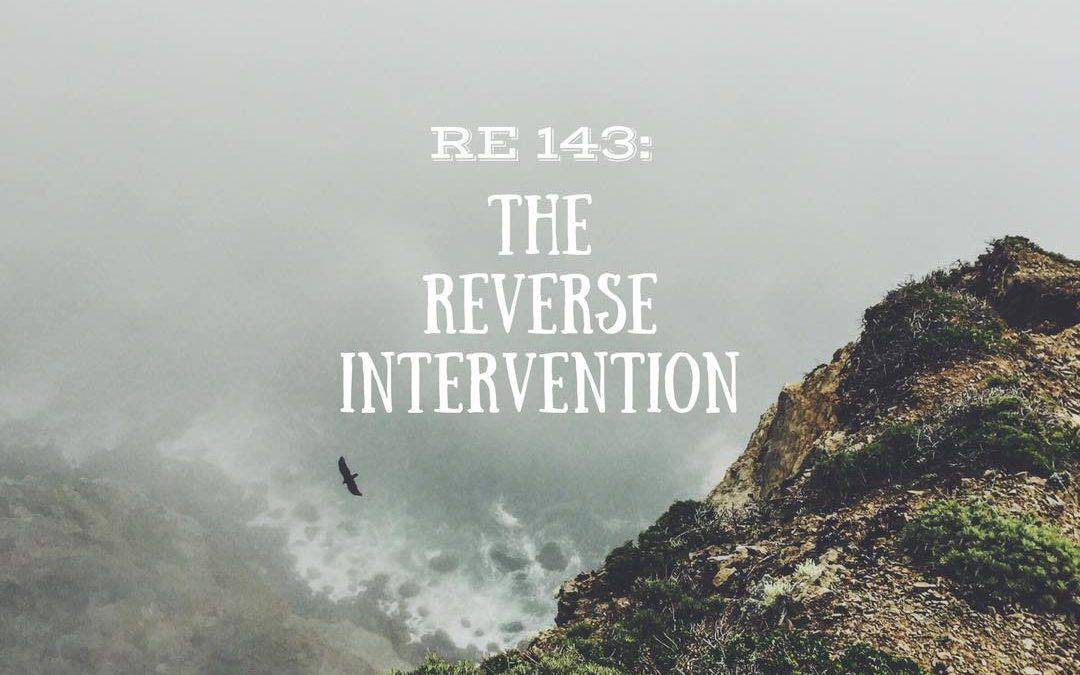
by Paul Churchill | Nov 13, 2017 | Podcast
Podcast: Play in new window | Download
Subscribe to the Recovery Elevator Podcast Apple Podcasts | | More
Paul discusses reverse interventions. They, “normal drinkers” don’t get it. How can we expect normal drinkers to understand what we are going through? What do you need to cover in a reverse intervention? Let them know this isn’t easy for you. Having the real conversation and being vulnerable. Lay out your game plan. Accountability is key.
Amy, with 11 years since her last drink, shares her story
SHOW NOTES
[11:40] Paul Introduces Amy. I’m 54, a Midwestern housewife. I have two grown sons, and husband of 34 years. What I do for fun has changed quite a bit over the years. I enjoy recovery, and spending time with my 4 dogs.
[23:35] Paul- You said when you finally discovered you had alcoholism, you started to recover. What is your definition of alcoholism?
Amy- My last drunk I ended up hospitalized. I didn’t believe you could drink enough to kill yourself. But I came real close. My husband found me, and got me to the hospital, or I would have died from alcohol poisoning. My doctor told me I had alcoholism. They handed me a meeting list, and I immediately started going to 12 step meetings. I finally felt like I landed on the planet I belonged in that I was seeking for 43 years.
[27:02] Paul- What did it feel like when you finally found your herd, you found your tribe?
Amy- It so radically changed my life. My husband calls me his second wife without the paperwork. I didn’t interact with society. I now seek out social situations. I have more friends than I can handle.
[33:25] Paul- Amy you mentioned something earlier you said “Give up the mind fight.” Tell us more what it meant for you to give up the mind fight.
Amy- When I heard a man say two things. I knew it was true. I can drink; I can drink with the best of them. I can’t say I can drink safely. The other one I heard was once I take the first drink; I have no control over my decisions, or where it will take me next.
[43:33] Rapid Fire Round
- What was your worst memory from drinking? Driving my children and neighbor kids to Great America and home in a blackout. It is over an hour on major highways from our home.
- Did you ever have an “oh-shit” moment? Second pregnancy, the day I brought him home, I wanted one glass of wine. I got really drunk, and when I woke up, there was a newborn in the house.
- What’s your favorite resource in recovery? 12 step meetings, personal relationships, and doing things like this out of my comfort zone.
- What’s the best advice you’ve ever received (on sobriety)? Just try; cause you can always go back to hell. Hell doesn’t close its door.
- What’s your plan in sobriety moving forward? I don’t have a plan. That’s one of the best things about sobriety. I wake up and go OKAY.
- What parting piece of guidance can you give listeners who are in recovery or thinking about quitting drinking? The only thing I can say, is come join us. It’s a wonderful thing. Everything I was trying to get from alcohol I have gotten 10 fold in sobriety. All is 10 times better in sobriety.
- You might be an alcoholic if… you wake up five years married thinking, “Did I really do that?”
Resources mentioned in this episode:
Brenaim1@yahoo.com (Amy’s email)
Connect with Cafe RE– Use the promo code Elevator for your first month free
Sobriety Tracker iTunes
Sobriety Tracker Android
Sober Selfies! – Send your Sober Selfie and your Success Story to info@recoveryelevator.com
“We took the elevator down, we gotta take the stairs back up, we can do this!”
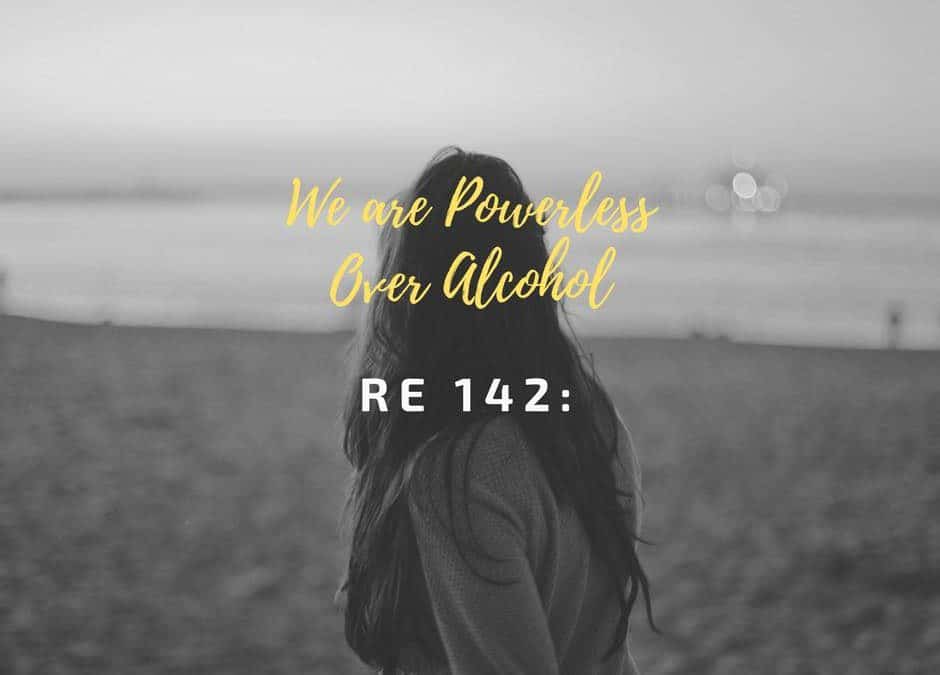
by Paul Churchill | Nov 6, 2017 | Podcast
Podcast: Play in new window | Download
Subscribe to the Recovery Elevator Podcast Apple Podcasts | | More
Paul discusses Step One: “ We admitted that we were powerless over alcohol, that our lives had become unmanageable.” from the Big Book of Alcoholics Anonymous.
David, with 46 days since his last drink, shares his story
SHOW NOTES
[10:20] Paul Introduces David. I’m a dad of 2 great boys aged 11, and 7. We live in Atlanta. I work at a software firm. I have been there for quite some time. I’m 42, and divorced. For fun there is a lot of baseball, I help coach basketball. Both my boys are in scouts. I love to play and collect guitars.
[12:52] Paul- When did you realize that perhaps you didn’t drink normal?
David- I have several memories of self-questioning my drinking habits going back a decade. I have milestones in my life I questioned my drinking.
[29:02] Paul- You are identifying yourself as a non-drinker. Have you experienced a different case of the F-its like I have 3 years of sobriety, F-it, I might as well keep moving forward?
David- I love this concept, I have not felt this feeling of you have come this far, you might as well keep going. I feel like that day is going to come. You have to be hopeful for the future. I am doing this. You have to balance that with healthy caution around relapse. I can be proud, I can be hopeful, but I have to be cautious.
[34:28] Paul- I know from the retreat you met a lot of people who have the same life goal, how has that affected you moving forward?
David- I described it when I started this journey. I didn’t have any tools. I had no institutional knowledge of what I was getting myself into. It was through your podcast I was introduced to AA in a meaningful way. What I learned from the retreat is that this is something where community helps.
[39:23] Rapid Fire Round
- What was your worst memory from drinking? You can insert any viscous hangover here. Missing a flight out of Vegas after a night of tearing it up. Head throbbing, and having to rearrange flights and childcare back in Atlanta while my head was throbbing.
- Did you ever have an “oh-shit” moment? When I figured out that the unit of measure was no longer 2 beers, it was a six-pack. No longer 3 glasses of wine, it was the entire bottle.
- What’s your plan moving forward? My number one internal dialogue is that I am no longer like that. I am no longer that person. It is almost a chant I give myself daily. I’m plugging back in with my therapist.
- What’s the best advice you’ve ever received (on sobriety)? While you’re working on your sobriety, your addiction is doing pushups.
- What parting piece of guidance can you give listeners who are in recovery or thinking about quitting drinking? Your litmus test is if you have you every asked yourself if you have a problem with alcohol, that is the test. I know I did that hundreds of times over a decade. Sick and tired of being sick and tired. The management of chaos we all endure as we introduce chaos into our evening routine.
- You might be an alcoholic if your favorite drink is “lots of it”
Resources mentioned in this episode:
Alcoholics Anonymous- Big Book
Connect with Cafe RE– Use the promo code Elevator for your first month free
Sobriety Tracker iTunes
Sobriety Tracker Android
Sober Selfies! – Send your Sober Selfie and your Success Story to info@recoveryelevator.com
“We took the elevator down, we gotta take the stairs back up, we can do this!”
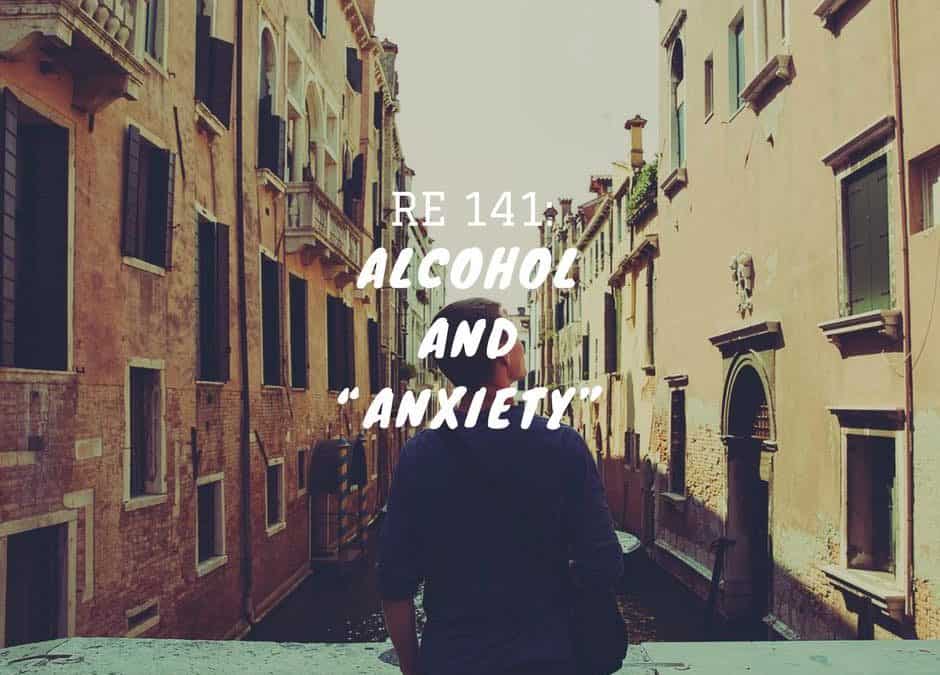
by Paul Churchill | Oct 30, 2017 | Podcast
Podcast: Play in new window | Download
Subscribe to the Recovery Elevator Podcast Apple Podcasts | | More
Anxiety as it relates to drinking is discussed. Alcohol suppresses the nervous system. It is a depressant. If we depress the nerves for long periods through binge drinking, our body reacts once the alcohol is gone by releasing adrenaline to compensate. This gives us severe anxiety in return. Which totally unbearable, and creates a fear that grabs you right in the chest.
Aaron, with 16 days since his last drink, shares his story
SHOW NOTES
[11:12] Paul Introduces Aaron. I’m 38; I live in Albuquerque NM, I work at a print shop. I’m separated, I used to like to fish, and want to get back into that. I like to be out in nature. I have a miniature pincher named Packer.
[13:29] Paul- How is it different this time? Explain that feeling that something clicked.
Aaron- My body was telling me with the anxiety and the insomnia. It wasn’t fun anymore. I was drinking miniatures while I was at work, and tried to hide all the time. Tired of being tired. I’m 38 years old, the party is over already.
[26:13] Paul- Talk about your experience with Opioids.
Aaron- I started off with the pills. Hydrocodone etc. Then I started doing oxy, and for a few years I was doing that. I was going through withdrawals because I couldn’t get them. I started going to the clinic and got on methadone.
[30:28] Paul- 16 days ago you were sick and tired of being sick and tired. What happened, and how did you do it?
Aaron- I started downloading and listening to podcasts. I was trying to figure out what this was, and how to stop. I jumped into it with both feet. I went through the tough first few days of detox. I stopped doing things that were triggering me.
[37:00] Rapid Fire Round
- What was your worst memory from drinking? Waking up in a Virginia jail, and couldn’t bond out because I was considered a flight risk.
- Did you ever have an “oh-shit” moment? The time I was in San Diego and hit that show and ended up in jail in another state.
- What’s your plan moving forward? I’m going to hit the podcast circuit. I’m going to create a program that will work for me.
- What parting piece of guidance can you give listeners who are in recovery or thinking about quitting drinking? Stop beating yourself up. Don’t try to think ahead too far.
- You might be an alcoholic if get pulled over in your work car going the wrong direction down a one way road and you didn’t know until you read the police report the next day.
Resources mentioned in this episode:
Anatomy of an Epidemic- By Robert Whitaker
Connect with Cafe RE– Use the promo code Elevator for your first month free
Sobriety Tracker iTunes
Sobriety Tracker Android
Sober Selfies! – Send your Sober Selfie and your Success Story to info@recoveryelevator.com
“We took the elevator down, we gotta take the stairs back up, we can do this!”
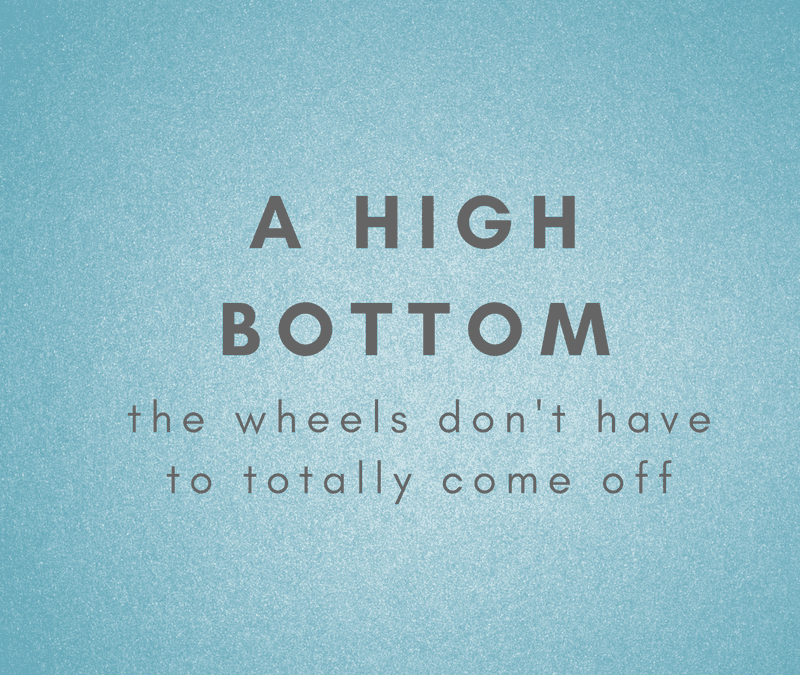
by Paul Churchill | Oct 23, 2017 | Blog, Early Sobriety, The Bottom, The First 24, The first Year
We all hear the stories of alcoholics who almost completely ruin their lives before getting sober. They are secretly chugging bottles of vodka, crashing cars, getting arrested, and continuously putting themselves into incredibly dangerous situations. I have addicts like this in my family, and I greatly sympathize with them. I am so proud of them when they finally do hit bottom and get sober. But do we have to experience such acute pain? Is there such a thing as a high bottom drunk?
But what about the alcoholics who have “high bottoms”? These are the people who, from an external view, seem to have a relatively healthy relationship with alcohol. Rather than continuing to speak in general terms, let me touch on my own relationship with alcohol and having a high bottom. I was a binge drinker from the age 17 until I was about 21. The first time I ever got drunk, I fell in love with what alcohol did to me. I went from being the shy and uncomfortable girl to being the witty and charismatic life of the party. Whenever I got drunk I fell in love with the people around me and kept the night going until I was the last person standing. Around age 21 I got my sh*t together, so to speak. I hit a rock bottom at this age, and it became apparent that I had to cut down on my drinking (if you are interested, I speak about some of my bottoms around this age on episode 99 of Recovery Elevator). I quit drinking for a month, and completely reevaluated my relationship with alcohol. Although at the time, I knew I was an addict, I convinced myself that I could continue drinking if I could implement moderation. I valued drinking so much that I forced myself to do this.
Surprisingly enough, I got really good at moderating alcohol. I credit a lot of this to the hangovers. I get incredibly bad hangovers after having only 3 or 4 drinks. The hangovers have become so bad, that as much as I love getting buzzed, even when I am 3 drinks in I often can’t justify having a fourth because I know too well how I will feel the next day. The bad hangovers have been enough to keep me in check with my drinking over the past few years.
I am 24 and although I spent two months at the start of this year sober, I have been continuously drinking for the past 3 years, until recently. During this time I have consistently worked, traveled around the world, paid all of my bills on time, and built and maintained some amazing friendships. I have been able to appear like your typical young adult. A lot of my friends have been in the advertising industry and we worked long hours during the week and spent our weekends partying on rooftops, often ending up at someone’s apartment where we would talk until 3 am about life! (you know the alcohol infused conversations that can miraculously jump from global warming to the illuminati to art, then to the Kardashians, and end up all the way back at the meaning of life?).
Even though everything seemed “fine”, I have continued to return back to this idea of sobriety. I don’t know how to describe it other than by saying there is a part of me that I keep deep inside that just knows I will live a better life sober. I am reminded of this come Sunday morning when I spend the day doing absolutely nothing other than nursing a hangover. I am reminded of this when I look in the mirror and see that my eyes have been drained of any spark they may have. I am reminded by this when I spend a few weeks sober, and notice that my body just starts to glow when I am not making it process alcohol. I am reminded of this when I wake up at 3 am and feel the dread and anxiety that comes after my wine buzz has faded. I am reminded of this when after a night out I awake and feel deeply unlovable. I am reminded of this when I realize I rely on alcohol to make me feel worthy of great relationships. I am reminded of this by all the subtle ways alcohol makes my life a bit darker.
Just as the ways drinking negatively affected my life were somewhat subtle, the ways sobriety impacts my life are also subtle. So far sobriety has not made me lose 20 pounds or get an amazing job or find an amazing life partner. For me sobriety looks like me spending 15 minutes every night stretching while listening to music I love. It’s being able to make plans on both weekend days because I no longer have to have one reserved for nursing a hangover. It’s allowing myself to sit with feelings like loneliness or sadness, without immediately trying to cover them up with a drunken night out. It’s finding the time to exercise 4-5 times a week, something I never had the energy to maintain while drinking. It’s money I’m saving. It’s going to bed knowing I will wake up and be myself, not the exhausted zombie alcohol makes me become.
As my days of sobriety tick by I start to flirt with the idea of drinking again. I justify this by reminding myself that I wasn’t an “out of control drunk”. I have a feeling that other people with high bottoms may do the same. All I can say is that in these moments, you must let these feelings come and go without acting on them. And then in the moments when you do feel good, really let yourself feel that and it will remind you why you are staying sober.
I am 24 days sober, and the reason why I stopped drinking this time is not because I hit a low. It’s because I am sick and tired of living a mediocre life. I am tired of being a “functional” alcoholic. I don’t want to go through life just simply functioning through it all- barely squeaking by. I want a life that is good, or possibly, maybe, even great. And I am fully aware that when I am drinking, I’m just not going to push for that. When I am drinking, I am fine settling for mediocre, as long as it means I can order another round.
I’ve been journaling a lot lately, and I recently wrote a love letter to my high bottom. I thanked it for allowing me to have to take responsibility for my sobriety. I am not choosing sobriety because things got so bad they couldn’t get any worse. I am not choosing sobriety to make a partner or my parents feel relieved. I am choosing sobriety because I believe it will lead to a better life. When you get sober at a high bottom, it means you are truly listening to yourself. You aren’t getting sober because the world is telling you to, it’s because you want to, and that is the fuel that will keep going.
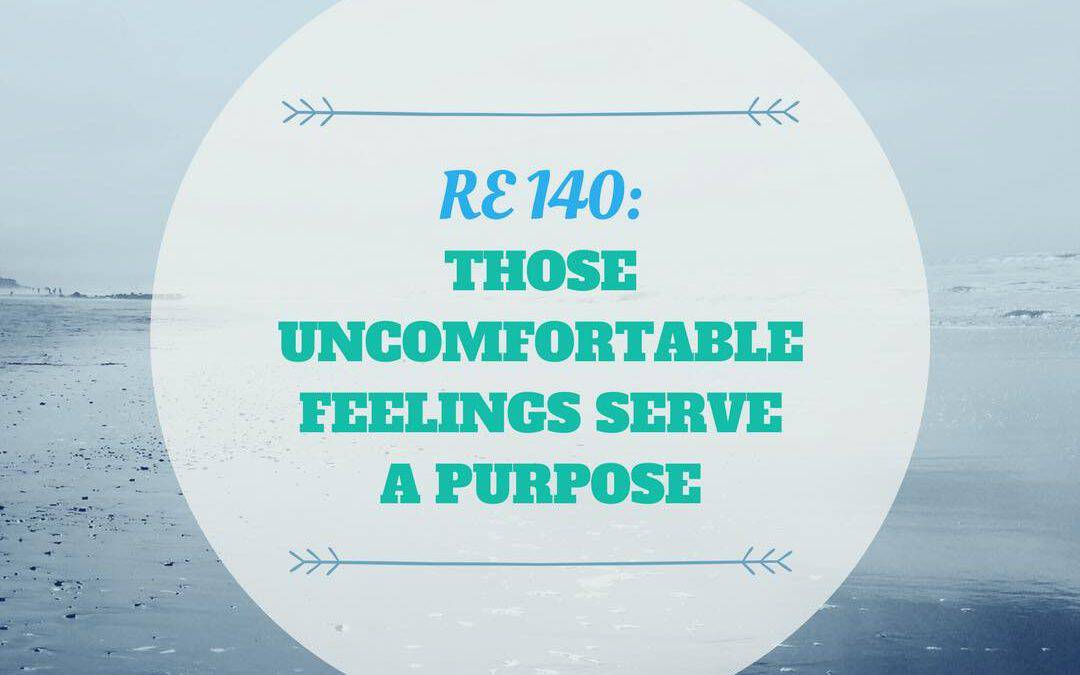
by Paul Churchill | Oct 23, 2017 | Podcast
Podcast: Play in new window | Download
Subscribe to the Recovery Elevator Podcast Apple Podcasts | | More
Paul discusses anxiety and depression as interpreted through an episode of the Dharmapunx Podcast.
Heather, with 269 days since her last drink, shares her story
SHOW NOTES
[10:50] Paul Introduces Heather. I’m 37; I live in Los Angeles, CA. I’ve been here for about 7 years. I grew up in south Texas. I work for a small cable network. I love yoga, hiking, going to the movies. I have an identical twin sister.
[16:04] Paul- When did you realize perhaps that you don’t drink normally?
Heather- I think its been varying stages of that. Moving from Texas to New York was an adjustment. I got a job in a bar, and that was my life.
[25:54] Paul- What was the impetus that really forced you to make that jump into sobriety?
Heather- I had been reading “A Happier Hour” and the light bulb went off when I was reading that book. I was also reading a blog from tired of thinking about drinking. I started a 100-day challenge.
[35:02] Paul- When did AA come into the picture?
Heather- I am still going. I am kind of afraid of the steps. Around day 60 or 70 I was feeling lonely about talking about it, and I was afraid to go. I put it out there, and things happened.
[40:28] Rapid Fire Round
- What was your worst memory from drinking? One of my best friends husbands passed away. Her father didn’t want any of us to be drinking, and I drank anyway. I should have not drank, but I had to.
- Did you ever have an “oh-shit” moment? One of the last conversations I had with my boyfriend when he said it will be okay and we will both stop. But if we break up, I’m fine, and I can continue to drink.
- What’s your plan moving forward? When I started the 100-day challenge, I want to keep clarity. I’m going to work the steps, and go to more meetings, and build more of a sober community here.
- What’s your favorite resource in recovery? Recovery Elevator, and a speaker meeting I attend in LA.
- What parting piece of guidance can you give listeners who are in recovery or thinking about quitting drinking? What you gain is so much more than you are giving up.
- You might be an alcoholic if you know your boyfriend is, and you decided to move in with him after 9 months, and you still don’t think you have a problem.
Resources mentioned in this episode:
This episode was brought to you by RXBAR. Visit RXBAR.com/recovery for 25% off your first order.
Dharmapunx Podcast Link
Tired of Thinking About Drinking
A Happier Hour- By Rebecca Weller
Connect with Cafe RE– Use the promo code Elevator for your first month free
Sobriety Tracker iTunes
Sobriety Tracker Android
Sober Selfies! – Send your Sober Selfie and your Success Story to info@recoveryelevator.com
“We took the elevator down, we gotta take the stairs back up, we can do this!”







